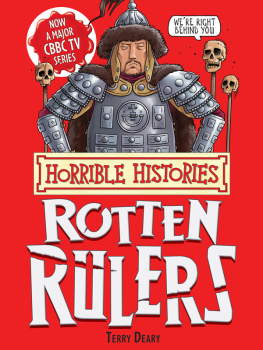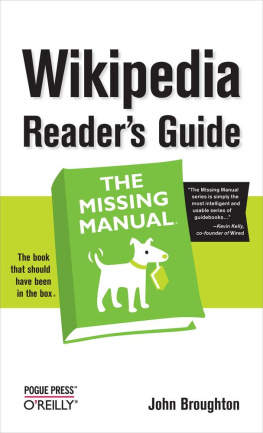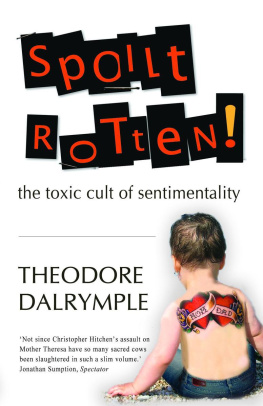Helen Buyniski - Wikipedia: Rotten to the Core
Here you can read online Helen Buyniski - Wikipedia: Rotten to the Core full text of the book (entire story) in english for free. Download pdf and epub, get meaning, cover and reviews about this ebook. year: 2018, genre: Politics. Description of the work, (preface) as well as reviews are available. Best literature library LitArk.com created for fans of good reading and offers a wide selection of genres:
Romance novel
Science fiction
Adventure
Detective
Science
History
Home and family
Prose
Art
Politics
Computer
Non-fiction
Religion
Business
Children
Humor
Choose a favorite category and find really read worthwhile books. Enjoy immersion in the world of imagination, feel the emotions of the characters or learn something new for yourself, make an fascinating discovery.

- Book:Wikipedia: Rotten to the Core
- Author:
- Genre:
- Year:2018
- Rating:4 / 5
- Favourites:Add to favourites
- Your mark:
- 80
- 1
- 2
- 3
- 4
- 5
Wikipedia: Rotten to the Core: summary, description and annotation
We offer to read an annotation, description, summary or preface (depends on what the author of the book "Wikipedia: Rotten to the Core" wrote himself). If you haven't found the necessary information about the book — write in the comments, we will try to find it.
Wikipedia: Rotten to the Core — read online for free the complete book (whole text) full work
Below is the text of the book, divided by pages. System saving the place of the last page read, allows you to conveniently read the book "Wikipedia: Rotten to the Core" online for free, without having to search again every time where you left off. Put a bookmark, and you can go to the page where you finished reading at any time.
Font size:
Interval:
Bookmark:
Wikipedia: Rotten to the Core
(NOTE: reposted this piece for anyone looking for more info after seeing my On Contact with Chris Hedges interview . originally published 25 Aug 2018 & again in revised form 14 Sep 2018)
For some time, Id heard rumors that Wikipedia was not the open-source knowledge utopia it claimed to be. Despite a comprehensive set of rules replete with checks and balances and a seemingly open democratic editing process, stories of pay-for-play editing, character assassinations, ideologically-driven trolling, and other offenses against public knowledge suggested all was not right in Jimmy Wales empire. Authors and public figures in fields as diverse as Complementary and Alternative Medicine and progressive politics (including Deepak Chopra, Rupert Sheldrake, Gary Null, John Pilger, and George Galloway) have complained of persistent negative coverage on Wikipedia despite the sites vaunted neutrality and the promise that Biographies of Living Persons are held to the highest standard. Efforts to have misinformation corrected were fruitless and their reputations have suffered as a result.
This seemed implausible. How could a site with over 100,000 volunteer editors, with open access for anyone looking to get involved, be engaged in such widespread bias? As an investigative journalist and activist who has spent many years seeking the truth in a landscape of obfuscation and lies, I decided to find out exactly what was going on at Wikipedia.
First, Wikipedia no longer has over 100,000 editors. The number of active editors has been declining for over a decade, even as fewer new editors join the site. MIT researchers found the complex bureaucracy and hard-line responses to newcomers mistakes were the primary reasons why would-be editors opted not to stick around. Meanwhile, the sites core of active editors decreased from 2007 to 2015 by 40%, dropping to about 30,000. In 2017, Purdue University reported that just one percent of those editors had made 77% of the total edits. The rate of changes rejected climbed from 6% in 2006 to 25% in 2010, and the site bans 1,000 IP addresses a day. Edit wars are resolved by silencing them. Editors who hang on long enough to become administrators capable of freezing and deleting entries no longer feel compelled to abide by Wikipedias rules, and statistics show that the number of editors approved to become administrators has plummeted since 2007. Wikipedia is an oligarchy with all the problems that entails. One set of rules exists for the user-citizen, and one for the ruling class of administrators and senior editors.
Wikipedia has a convoluted and lengthy policy on conflicts of interest, a policy that seems to lengthen whenever another pay-to-play edit scandal breaks. And there have been a lot of these scandals. Disclosing ones conflicts of interest is not even mandatory but a generally accepted standard that editors should attempt to follow. The unwritten law seems to be that paid editors should only engage in conflict-of-interest work if they can do it without getting caught and embarrassing the site. If you cant obey the rules, at least break them quietly. Many paid editors do opt to follow the policy, disclosing their conflicts of interest and liaising with third-party editors to modify their clients entries, but many more slip through the editorial process unnoticed.

Quid Pro Quo
In 2013, a British Petroleum representative was found to be supplying Wikipedia editors with company-approved text that eventually comprised 44% of BPs page. The editing took place while a civil trial was underway which could have resulted in BP paying out billions of dollars to victims of the 2010 Deepwater Horizon oil spill. The process itself PR flack supplies biased info to an unaffiliated editor, who then inserts it without disclosing its origins is common on Wikipedia and does not actually violate the rules, as BP was quick to point out. Indeed, multiple editors jumped to the defense of the editor working for BP, suggesting they were also being paid or merely wanted to keep their options open.
Roger Bamkin, a trustee of the Wikimedia Foundation UK and a PR consultant, used his Wiki position to place his PR client, the country of Gibraltar, on Wikipedias did you know front page feature 17 times during August 2012. As a Wikipedian in Residence, Bamkin was not permitted to operate with a conflict of interest or to edit the pages of the organization he worked with, but nothing in the rules prevented him from promoting that page. Wikipedia co-founder Jimmy Wales called Bamkins behavior wildly inappropriate and denounced it in a double-speaking editorial. Basically, he told future emulators to be more circumspect in their behavior, because the disaster for our reputation would be immense if it got out that Wikipedia editors were paid shills instead of free and independent scribes. Wales understands the importance of ones online reputation, which makes it even more unconscionable that his site has been weaponized to destroy the reputations of so many people.
During the time Bamkin was being encouraged to resign, another Wikipedian in Residence, Max Klein, was discovered to be selling Wikipedia Editing as a PR Service on his website, UntrikiWiki, boasting that he had the expertise needed to navigate the complex maze surrounding conflict of interest editing on Wikipedia. In October 2013, editors found hundreds of sockpuppet accounts linked to one company WikiPR, which claimed to employ not only garden-variety editors but an admin capable of freezing and deleting pages. WikiPR claimed over 12,000 clients, from household names like Viacom and Priceline to minor firms whose pages were frequently deleted for not meeting Wikipedias notability standards. Once again, Wikipedia management condemned the practice, not because it was dishonest, but because companies engaging in self-promotional activities on Wikipedia have come under heavy criticism from the press and the general public, with their actions widely viewed as inconsistent with Wikipedias educational mission. In other words, theyre saying, stop making us look bad.
In a bizarre coda to the WikiPR affair, Cooley LLP, the law firm contracted by the Wikimedia Foundation to send a cease-and-desist letter to WikiPR, was editing its own articles as well. Cooleys letter misrepresented Wikipedias terms of service, claiming sockpuppeting and paid editing were both expressly prohibited by the site when the whole point of the WikiPR scandal was that it exposed the giant regulatory loopholes permitting paid advocates to make Wikipedia their promotional playground. Rounding out the letter were ominous yet empty threats the foundation was prepared to take any necessary legal action to protect its rights, as if any nation had laws on its books prohibiting the paid editing of crowdsourced online encyclopedias suggesting that Cooley partners spent more time editing their firms Wikipedia article to remove embarrassing facts like a partners support for Californias Proposition 8 than reading up on relevant case law.
Rules Are Made to Be Broken
Wikimedia UK only won its nonprofit status in 2011, and the Bamkin scandal drew intense criticism from the sector. Nonprofit Quarterly took him to task for violating the foundations tenets, noting that Gibraltarpedia was the second major scandal in the UK foundations year as a nonprofit. Trustee chairman Ashley van Haeften resigned the previous month when he was banned for life from editing Wikipedia, having clashed with several editors over the hosting of explicit images on the site. The American arm of the Wikimedia Foundation has been involved in even more questionable behavior. Wikimedia project director Sarah Stierch was fired in January 2014 after a screenshot emerged as proof she was selling her services as an editor. Amidst the fallout from the WikiPR scandal and Stierchs firing, it was decreed that all paid Wikipedia editors must disclose their status. However, without a way to enforce such an edict, the measure is ultimately hollow. The Wikimedia Foundations own Financial Dissemination Committee laments that the Wikimedia Foundations own planning process does not meet the minimum standards of transparency and planning detail that it requires of affiliates and points to an absence of goals and budget transparency as setting a bad example for the rest of Wikipedia. If Wikimedia cant even follow its own transparency guidelines, where else is it falling short?
Next pageFont size:
Interval:
Bookmark:
Similar books «Wikipedia: Rotten to the Core»
Look at similar books to Wikipedia: Rotten to the Core. We have selected literature similar in name and meaning in the hope of providing readers with more options to find new, interesting, not yet read works.
Discussion, reviews of the book Wikipedia: Rotten to the Core and just readers' own opinions. Leave your comments, write what you think about the work, its meaning or the main characters. Specify what exactly you liked and what you didn't like, and why you think so.









